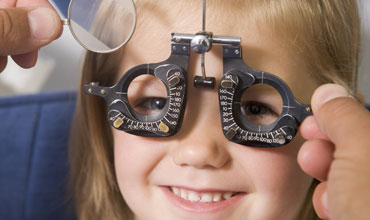It is important for your child to get routine eye exams to detect any signs of nearsightedness, farsightedness, or astigmatism so that any treatment may be addressed early on with eyeglasses or contact lenses. Routine exams make sure that your child has healthy eyes, important for their vision development. Learning-related vision problems account for 20% of all learning disabilities, so be sure to have their eyes checked yearly
Early eye exams also are important because children need the following basic visual skills for learning:
- Near vision
- Distance vision
- Eye teaming (binocularity) skills
- Eye movement skills
- Focusing skills
- Peripheral awareness
The American Academy of Ophthalmology says that your family doctor or pediatrician likely will be the first medical professional to examine your child’s eyes. If eye problems are suspected during routine physical examinations, a referral might be made to an eye doctor for further evaluation. Eye doctors have specific equipment and training to assist them with spotting potential vision problems.
Important milestones for your child’s exams are:
- An optometric exam performed at 6 months to ensure that the eyes are working together during these early years, as well as rule out any ocular disease.
- At the age of three as a follow up exam to track developmental progress.
- Again when they begin school to ensure detection of vision problems that may interfere with their learning process.
